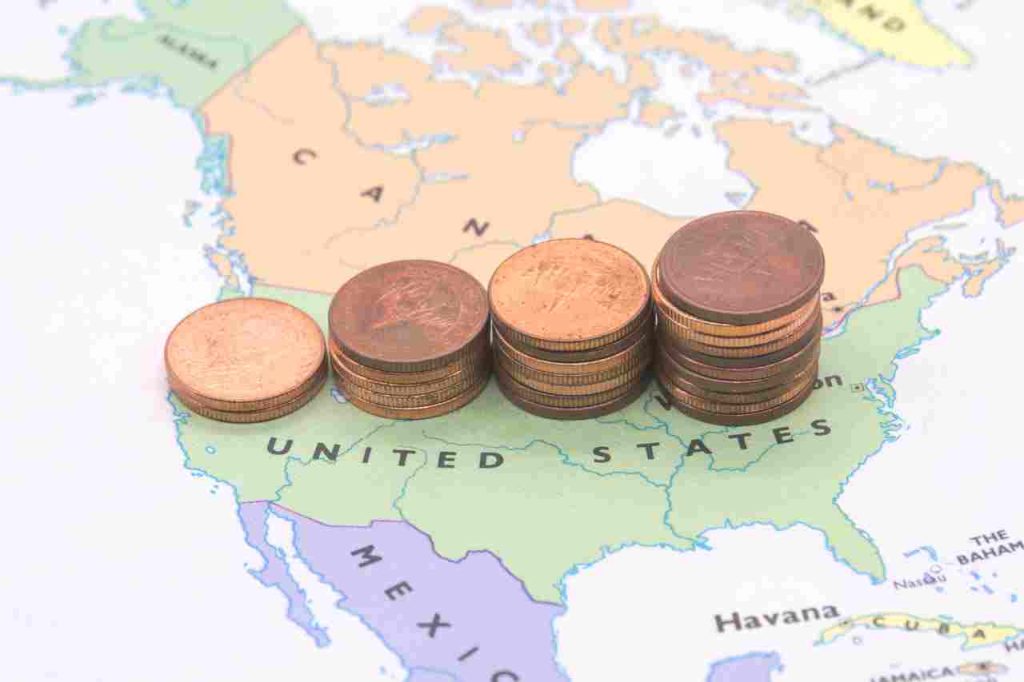Table of Contents
International investing refers to the practice of investing in assets outside of your home country.
This can include stocks, bonds, real estate, and other assets in countries worldwide. With the increasing globalization of markets and the availability of low-cost investment options, more investors are considering adding international exposure to their portfolios.
There are several potential benefits to investing in international markets, including diversification, the potential for higher returns, currency diversification, and access to new investment opportunities.
However, risks are also associated with investing in international markets, such as currency risk, political and economic risk, cultural and social differences, and liquidity risk.
This blog article will examine the advantages and dangers of investing abroad and go through several investment choices.
We will also provide tips for managing risks and creating a diversified international investment portfolio.
Benefits of investing in international markets
Investing in international markets can provide several benefits to investors. Here are some of the key advantages:
Diversification means spreading investments across different asset classes, industries, and geographies to reduce the risk of losses due to any one company or economic event.
Investing in international markets is particularly important for investors who live in countries where the economy is heavily concentrated in a few sectors or industries.

For example, an investor in the US who only invests in US-based companies is heavily exposed to the US economy and may experience significant losses if the US economy experiences a downturn.
By investing in international markets, however, that same investor can reduce the risk of losses by spreading their investments across multiple countries and industries.
International investing also provides access to sectors and industries that may not be available in the domestic market.
For example, an investor in the US may not have access to companies in emerging markets such as China or India.
By investing in international markets, that investor can gain exposure to these fast-growing economies and potentially benefit from their growth.
Potential for higher returns
Investing in international markets can offer the potential for higher returns compared to investing solely in domestic markets. Here are some reasons why:
Access to fast-growing economies
Many emerging market economies are growing faster than developed economies, which can lead to higher returns for investors.

For example, countries such as China and India have seen strong economic growth over the past decade, providing opportunities for investors to capitalize on this growth.
Exposure to different industries and sectors
International markets offer access to companies and sectors that may not be available in the domestic market, providing investors with a broader range of investment opportunities.
For example, technology and e-commerce companies such as Alibaba and Tencent are prominent in China but not widely available in the US market.
Currency fluctuations
Investing in international markets also exposes investors to currency fluctuations, which can affect returns.
If an investor’s home currency appreciates against the money of the international market they are invested in, their returns may increase due to the currency exchange rate. However, if their home currency depreciates, their returns may decrease.
It is essential to remember that investing in foreign markets entails additional risks, including currency risk and political and economic uncertainty. Investors should carefully weigh the risks and possible benefits before making any investments, as with any investment.
Currency diversification
Investing in international markets allows investors to diversify their investments across different currencies, which can help reduce currency and inflation risks.
Here are some ways that investing in international markets can provide currency diversification:
Exposure to different currencies
When investors invest in international markets, they gain exposure to the currencies of the countries in which they support.
This provides an opportunity to diversify their investments across different currencies, reducing the risk of losses due to currency fluctuations.

Hedging against currency risk
Investors can also hedge against currency risk by investing in currency-hedged exchange-traded funds (ETFs) or mutual funds.
To lessen the effect of currency volatility on their returns, these funds employ currency hedging techniques.
Protection against inflation
Investing in international markets can also protect against inflation, which can erode the value of investments.
By investing in countries with lower inflation rates, investors can potentially benefit from higher absolute returns.
It is important to note that currency diversification also comes with risks, such as the potential for currency devaluation or fluctuations in exchange rates.
Access to new investment opportunities
Investing in international markets provides access to new investment opportunities that may not be available in the domestic market. Here are some examples:
Emerging markets
Investors have access to rapidly expanding economies and sectors in emerging nations like China, India, Brazil, and Mexico that may not be present in the home market.
These economies are often experiencing higher rates of economic growth than developed economies, which can lead to higher returns for investors.
Unique industries
International markets also expose unique industries that may not be available in the domestic market.
For example, the European markets offer exposure to the luxury goods industry, while the Asian markets offer exposure to the technology and e-commerce sectors.

Portfolio diversification
Investing in international markets also provides an opportunity to diversify portfolios across different countries, industries, and currencies, reducing the risk of losses due to any one company or economic event.
Access to global brands
Investors have access to some of the biggest and most successful firms in the world by making investments in overseas marketplaces.
For example, investors in the US market can access global brands such as Toyota, Samsung, and HSBC, which may not be available in the domestic market.
Investing in international markets also comes with additional risks, such as political and economic instability, regulatory differences, and currency risk.
Risks of investing in international markets
While investing in international markets can provide numerous benefits, it also comes with some risks that investors should be aware of.
Here are some of the primary risks of investing in international markets:
Money risk
The danger that changes in currency exchange rates will have an impact on an investor’s profits is known as currency risk or exchange rate risk. When investing in international markets, investors must convert their home currency into the currency of the foreign market in which they are supporting.
If the investor’s home currency depreciates against the foreign currency, their returns may decrease when they convert their investment back into their home currency.
On the other hand, if the investor’s home currency appreciates against the foreign currency, their returns may increase when they convert their investment back into their home currency.
This currency risk can have a significant impact on an investor’s returns, particularly in volatile currency markets.
Political and economic instability
Political and economic instability is one of the significant risks associated with investing in international markets. Political turmoil, social unrest, and changes in government policies can have a substantial impact on the value of investments.
For example, a sudden change in government policy, such as increased taxes or new regulations, can negatively impact the profits and growth prospects of companies operating in that market.

Similarly, social unrest and political instability can lead to declines in the stock market and other assets. In extreme cases, such as a military coup or civil war, investors may even risk losing their entire investment.
Investors must carefully consider the political and economic environment of the foreign market before investing and must be prepared to adjust their investment strategy in response to changing conditions.
Working with a financial advisor who is familiar with the specific risks and opportunities of different international markets can be particularly helpful in managing this type of risk.
Regulatory differences
Regulatory differences between domestic and international markets can also pose risks for investors.
Different regulations, laws, and accounting standards can make it challenging for investors to navigate foreign markets and understand the actual dangers of investments.
Market volatility
Market volatility is another risk associated with investing in international markets. Economic cycles, geopolitical events, and market sentiment can all contribute to greater volatility in global markets, resulting in greater fluctuations in investment returns.
This volatility can make it more difficult for investors to achieve their investment goals, mainly if they are investing for the short term.
In addition, market volatility can also lead to a phenomenon known as “herding behavior,” where investors may panic and rush to sell their investments at the first sign of trouble.
This can exacerbate the volatility in the market and lead to further declines in the value of investments. To mitigate this risk, investors should diversify their portfolios across different markets, sectors, and asset classes and should also consider their investment horizon and risk tolerance when making investment decisions.
Investors need to stay disciplined, stick to their investment plan, and avoid reacting emotionally to short-term market fluctuations.
A well-diversified investment plan that is in line with an investor’s long-term objectives and risk tolerance may be developed with the assistance of a financial advisor.
Liquidity risk
The danger of not being able to acquire or sell an investment at a reasonable price owing to a lack of trading volume or market circumstances can also be present for investors when investing in foreign markets.

While investing in international markets can provide valuable investment opportunities, investors must be aware of the risks and take steps to mitigate them.
It is vital to research potential investments carefully and to work with a financial advisor who can help guide investment decisions.
How to invest in international markets
Investing in international markets can be done in several ways, depending on the investor’s preferences and investment goals. Here are some common ways to invest in global markets:
International mutual funds or exchange-traded funds (ETFs)
International mutual funds and ETFs are popular investment vehicles for gaining exposure to international markets.
These funds allow investors to invest in a diversified portfolio of global securities, which can help to mitigate the risks associated with investing in a single foreign market or security.
International mutual funds and ETFs may specialize in specific regions, such as Europe or Asia, or may focus on particular sectors, such as technology or energy.
These funds may also differ in terms of their investment strategy, with some funds focusing on growth-oriented stocks while others may concentrate on value-oriented stocks.
To choose which foreign mutual fund and ETF best suits their investing objectives and risk tolerance, investors need thoroughly compare the many options available.
It’s important to note that international mutual funds and ETFs come with their own set of risks, such as currency risk, political and economic instability, and market volatility.
Investors should thus carefully assess these risks before making any investments and make sure their investment portfolio is well-diversified and has a good balance of local and foreign assets.
Investors should take these funds’ fees into account as well because large fees have a tendency to reduce investment returns over time.
Finding the ideal foreign mutual fund or ETF to satisfy an investor’s unique investment goals and risk tolerancecan be made easier by working with a financial advisor.
American Depository Receipts (ADRs)
ADRs are a way for U.S. investors to invest in foreign companies. They are issued by U.S. banks and represent ownership in a foreign company’s stock.
ADRs trade on U.S. stock exchanges and investors can buy and sell them like any other stock.
Direct investment in foreign stocks
Investors can also invest directly in foreign stocks by opening a brokerage account that allows trading on international stock exchanges.
However, investing directly in foreign stocks can be more challenging due to regulatory differences, language barriers, and currency risk.

Global investment firms
Another way to invest in international markets is through global investment firms with expertise in international investing.
These firms can help investors navigate foreign markets, identify investment opportunities, and manage currency risk.
Emerging market funds
Investors can also invest in emerging market funds that focus on the stock markets of developing countries. These funds offer investors access to some of the world’s fastest-growing economies and can provide diversification benefits.
Conclusion
Investing in foreign markets may offer advantageous choices for people wishing to diversify their portfolios and get access to new investment opportunities.
Benefits include diversification, potential for higher returns, currency diversification, and access to new investment opportunities.
However, investing in international markets also comes with risks such as currency risk, political and economic instability, regulatory differences, market volatility, and liquidity risk. Investors must be aware of these risks and take steps to mitigate them.
There are several ways to invest in international markets, including international mutual funds or ETFs, ADRs, direct investment in foreign stocks, global investment firms, and emerging market funds.
It is essential to carefully research potential investments and to work with a financial advisor who can help guide investment decisions.
Investing in international markets can provide valuable benefits, but it is not without risks. Investors may be able to achieve their investing goals while diversifying their portfolios and expanding their exposure to new investment possibilities by being aware of these risks and taking action to reduce them.










